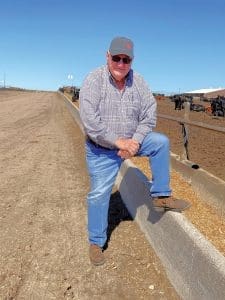By Patti Wilson Contributing Editor
Providing preventative care for livestock is an objective that Boehringer Ingelheim takes seriously. I spoke with Dr. Joe Gillespie, Professional Services Veterinarian for the animal health company, during the Cattle Industry Convention in February. His suggestions to mitigate summer stresses entail good management advice for cow-calf producers in particular and yearling operations in general.
Gillespie says that there are many factors involved in summer calf stress. 2023, in particular, provided a variety of opportunities for infections to creep into calf crops. Drought, dust and high temperatures are a norm, but last year the United States was inundated for days with smoke from Canadian and northwestern United States forest fires.
According to Gillespie, the mucosal lining is the first line of defense; irritants like dust and smoke break down that barrier. The effects of dry conditions dehydrate calves, opening the pathway for virus and bacterial pathogens to enter.
Reduce the Stress
Although we cannot control the weather, we can help minimize stress with good herd management. This always begins with adequate colostrum intake and a well-planned vaccination program to get calves ready for grass turnout. Gillespie emphasizes that working with your veterinarian is imperative. As your best resource for building an effective vaccination program, they will know which specific pathogen risks are the greatest threat in your area.
Pastures come with their individual hurdles, one of which includes the difficulty in retreating cattle in large areas. Gillespie recommends long-acting antibiotics when treatment is needed, which can avoid the stress of handling calves a second time. Some anti-infectives last six to nine days and are a great benefit in long-term stress management.
Alternative Applications
When planning your calf vaccination program, there are many factors to consider. What type of protection do you need and when do you need it? If you are having young calf health issues, you could consider an intranasal vaccine, which can provide mucosal (local) immunity, but ultimately you need a parenteral or injectable vaccine to create acquired (memory) immunity for durable protection over the long haul.
Those Pesky Flies
With summer comes flies, and “their habitat must be controlled in any way possible,” Gillespie says. “Fly tags need to be managed. One tag at turnout does not work.”
Internal parasites must also be addressed. Again, long-lasting control is important to consider. There are parasiticides on the market that provide protection through most of grazing season.
The Value of Our Cow Herd
With the value of cattle at an all-time high and our cow herd numbers at historic lows, Gillespie warns that U.S. heifer retention is not yet high enough to replace numbers lost to drought in the past several years. Those heifers making their way back into our national cow herd must be managed in an extraordinary way to guarantee optimum fertility. He says heifers need to be heavy enough to breed early and vaccinated appropriately. Proper management will increase the chances of retention in the long haul.
Keep Learning
Boehringer Ingelheim hosts cattle management classes around the country. They use a systems approach to health and breeding. Far from recommending “cost cutting” as a means of generating profit, they encourage looking for causes of costs, evaluation of costs and benefits of basic health protocols.






